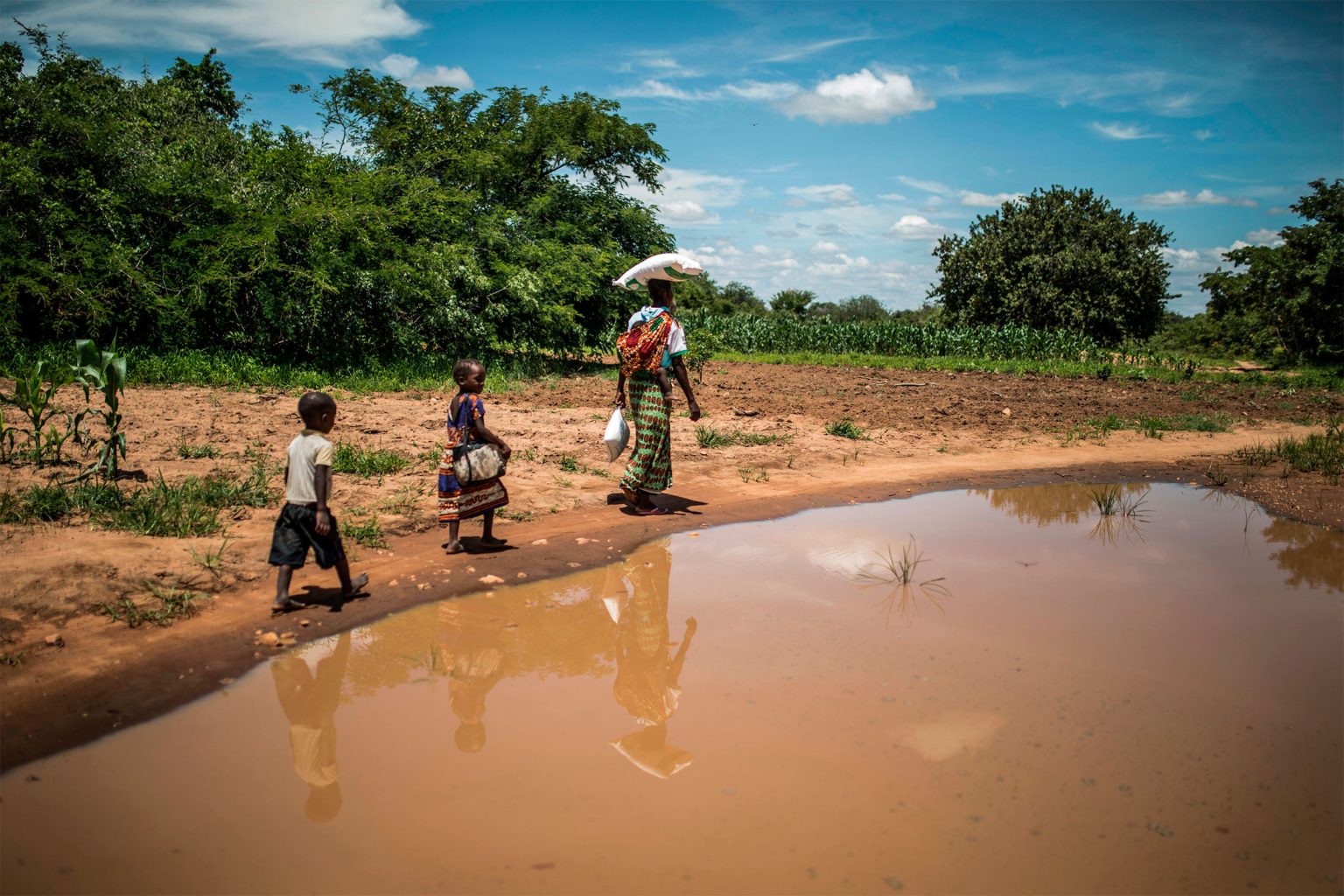Despite producing less than 4% of global greenhouse gas (GHG) emissions, Africa is at the core of the global climate change catastrophe.
- Agricultural progress may be difficult if African farmers are subjected to more severe climatic effects.
- Africa faces significant challenges of rising continental temperatures and a growing population.
- Food Insecurity is a major issue for people in countries throughout Africa and most of the world.
Despite producing less than 4% of global greenhouse gas (GHG) emissions, Africa is at the core of the global climate change catastrophe. Extreme weather events will become more frequent and severe in Africa than elsewhere on the planet. The continent’s poverty, food insecurity, and limited adaptation ability make it especially susceptible to climate consequences.
Read: Flood economics: What Tanzania should do to improve cities
Africa’s fast population growth exacerbates the issue. According to most estimates, Africa’s population will double by 2050 and then double again by 2100, finally reaching over 4 billion by the end of the century. Feeding Africa’s rising population will need considerable breakthroughs in the continent’s food systems.
However, agricultural progress may be difficult if African farmers are subjected to more severe climatic effects. To prepare for these future difficulties, one must understand how climate change will materialize in Africa and its impact on the continent’s agricultural systems.
Africa’s global warming outlook
The Intergovernmental Panel on Climate Change (IPCC) has proposed several projected warming scenarios in Africa, all of which highlight the severity of the situation. Africa’s temperatures will rise faster than the global average, ranging from 0.2°C to more than 0.5°C per decade.
While low-end instances where continental temperatures do not increase by more than 1.5°C over pre-industrial levels are feasible, they grow less plausible each year that the world fails to reduce global greenhouse gas emissions. Similarly, the IPCC’s worst-case scenarios, in which Africa heats by 2°C by 2050 and more than 4°C by 2100, are becoming more plausible. While it is difficult to anticipate the consequences of these warming scenarios in Africa, scientists are beginning to give us a decent idea—and their forecasts are terrifying.
There will be significant changes in continental rainfall under the IPCC’s ‘business-as-usual’ warming scenario, in which global emissions continue at their current pace and temperatures in Africa rise by 4°C by the end of this century.
These changes may follow a ‘dry becomes dryer, and wet gets wetter’ pattern, with Africa’s wet parts towards the equator receiving a 30% increase in rainfall and the continent’s existing dry sections seeing a 20% reduction. As these changes accelerate, Africa will face extended periods of drought and floods, depending on the location.
Floods, drought and extreme heat vulnerabilities in Africa
The rising frequency of drought remains evident in East Africa. A drought induced by a weak or failed rainy season occurred every five to six years before 1999. Poor rainfall seasons have occurred every two to three years since 1999. According to current projections, the number of East Africans vulnerable to drought would expand by up to 54% towards the century’s end. This would expose millions more to times of catastrophic drought in East Africa alone, and the situation is considerably dire in Africa’s already drought-prone northern and southern areas.
While drought now affects many Africans, floods are not far behind. Flood incidents in Sub-Saharan Africa have increased tenfold since the 1970s. Floods and tropical storms displaced 1.2 million Africans in 2020, more than double the number of persons displaced by violent conflict.
Unfortunately, the situation will only deteriorate in the future. The Indian Ocean is now the world’s fastest-warming ocean, with temperatures rising by up to 2.7°C over this century. Because of the higher temperatures, tropical storms absorb more water vapour and heat, resulting in stronger winds, more rainfall, and more floods when they reach landfall.
Extreme heat is another climate consequence often underreported due to data gaps. While temperature increases of 2 to 4°C are already worrying, climate change would exacerbate temperature extremes. The heating would culminate in potentially lethal heatwaves. The summer heatwave that killed more than 70,000 people in Europe in 2003 remains a perfect example.
Africa faces significant challenges of rising continental temperatures and a growing population. Therefore, experts predict that 20 to 50 times more people in African cities will get exposed to excessive heat by the end of this century.
Agriculture and food security
Due to climate change, 118 million people in Africa will face extended periods of drought, floods, and excessive heat. While these situations are frightening, they are just the tip of the iceberg. Climate change will also affect agriculture and food security.
Every day, 240 million Africans face hunger. Global warming within the range of current IPCC forecasts increases the number of malnourished Africans by 25 to 95 per cent by 2050. The increase represents 25%, 50%, 85%, and 95% in Central Africa, East Africa, Southern Africa, and West Africa, respectively.
There are several reasons why climate change proves a significant threat to African agriculture. Many staple crops in African cuisines, including wheat, maize, sorghum, and millet, struggle to thrive as temperatures rise. Crop yields in Sub-Saharan Africa will fall by 10% if temperatures rise by 2°C. Crop yields will decline by up to 20% if temperatures rise over 2°C. If global warming exceeds 3°C, all current African maize, millet, and sorghum growing regions will become unsuitable. Sorghum and millet are essential grains in most African diets. Moreover, maize accounts for over half of the calories and protein consumed in southern and eastern Africa.
Animals are also sensitive to rising temperatures in Africa. According to International Livestock Research Institute (ILRI) the number of days of acute heat stress each year will skyrocket in the following decades. The rise will make it more difficult to rear animals outdoors. Consequently, this will render large portions of the continent unfit for livestock production by the end of the century.
The inability to keep animals outside would be disastrous for Africa’s food security since millions of people on the continent rely on livestock for sustenance. Animal-derived meals are also essential in the battle against malnutrition.
Read: Why a Biden Administration is Good For Africa
Water scarcity
Another impending challenge to Africa’s agricultural systems is the scarcity of water. Up to 95% of the continent’s farmers lack irrigation infrastructure, leaving them entirely dependent on rainfall. Rains may drop in many parts of the continent. Consequently, farmers in Africa’s arid areas may struggle to find enough water for their crops and cattle since the prevalence of drought is already rising.
The Horn of Africa is presently facing its third failed rainy season, destroying crops, killing cattle, and threatening the area with widespread food shortages and starvation. Far from being an exception, the present drought is regrettably foreshadowing things to come.
Floods and storms
However, the most significant threat to food production is not necessarily a water shortage. Floods and storms have already shown to be disastrous for agriculture in Africa’s coastal areas. Cyclone Idai ripped over Mozambique in 2019. The effect was flooding farms, tearing crops from the ground, and eventually leaving over 1 million people needing emergency food assistance. Even less destructive storms may be very harmful since crops and cattle cannot survive in areas with severe rainfall and flooding.
Agricultural pests
The spread of agricultural pests is an often-overlooked effect of climate change. Shorter winters and rising temperatures will make it simpler for pests to infest new areas and reproduce more rapidly. Warming temperatures and shifting rainfall patterns significantly contributed to the 2019 locust outbreaks in East Africa. The locusts devastated crops and pastureland as they moved throughout the area, putting 13 million people in danger of an acute food crisis.
Agriculture and food security prospects in Africa
Mitigation approaches
Global attempts to combat climate change should begin with mitigation. The most hazardous warming scenarios proposed by the IPCC are not carved in stone, but they should sound a warning to no longer postpone global action to reduce GHG emissions.
Whereas African agriculture and livestock contribute to global GHG emissions, the African continent accounts for just a minute fraction of overall global emissions. As a result, international efforts to reduce GHG emissions must be led by the world’s more prosperous and polluting countries.
Adaptive approaches crucial
However, as witnessed in the last several decades, climate change is no longer a distant concern. It’s occurring right now, and millions in Africa are already suffering. As a result, adaptive techniques are equally crucial.
Modernizing Africa’s agriculture industry is the first step toward adaptation. Significant investments in irrigation, enhanced infrastructure and expanded access to financial instruments such as crop and animal insurance will be required. Research and development are needed to establish stress-tolerant crops and animal varieties and more sustainable resource management strategies.
Policy changes
There is also an opportunity for policy changes. Policies should seek to improve global food security by linking farmers from all over the globe and integrating international markets. Moreover, policies provide incentives for young people to return to rural regions and participate in sustainable farming and food production.
For successful actions, global actors and stakeholders must adjust policy frameworks to local circumstances. This way, they can account for the particular consequences of climate change in various regions of the globe.
For far too long, the world has ignored African agriculture and failed to appreciate its enormous potential. Africa confronts more severe climatic consequences. Moreover, with the growing population needs ever-increasing quantities of food. Thus, it is clear that much of Africa’s future rests in the hands of its farmers. Many technologies, such as stress-tolerant crops and irrigation systems, already exist to boost farmers’ resistance to climate change.
If these advances do not reach African farmers, the repercussions will be disastrous for hundreds of millions of people. Contrastively, collaborating with African farmers ensures they have the resources needed to adapt to climate change. Moreover, the farmers can produce enough food for an expanding population. The move sets the groundwork for a healthy and economically prosperous Africa in the coming decades.
Read: Kenya’s markets remain resilient despite rising political temperatures




